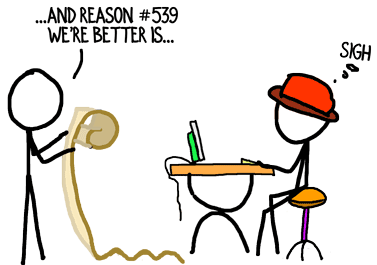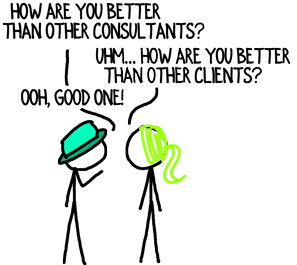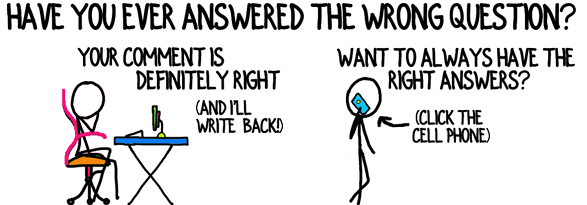You know a rain barrel full of reasons why your consulting firm is better than other firms that do what you do. Among the reasons, of course, is you. Your experience and ideas and unique perspective.
Hence, when Bethany Buttonwerk asked you why her company should work with your consulting firm instead of others she’s talking to, you quickly trotted out all your advantages.

Alas, that lessened your likelihood to win the project!
Oh no. Why’d that happen?
Let’s revisit Bethany’s query. Unfortunately, she unwittingly asked the wrong question. You then proudly tootled your answers to her mistaken question, which left her dissatisfied, disgruntled, and disinterested. (And you disappointed or dyspeptic.)
Bethany asked something along the lines of, “What makes you better than other consulting firms I could hire for this work?” Or, at its essence:
What makes YOU BETTER than THEM?
Her question makes you think you should be talking about your consulting firm and comparing yourself favorably to other consulting firms.
But what Bethany really wants to know is:
What makes you BEST for ME?
Oh, that’s entirely different. She doesn’t want to hear about you and your consulting firm. In fact, listening to you place yourself above others is a bit of a turnoff. She actually wants to hear about herself and how you’ll help her out of her tight predicament.
So, your ideal response hits three points:
- You, Bethany, are who we’re focused on. (Not us.)
- Bethany, you’ll achieve your goals with our consulting firm.
- Bethany, you’re not risking harm when you work with us.
Since you’re an astute consultant, you noticed those three points correspond to the Trust Triangle (mentioned here and explained here) and you realized that to answer them requires extensive discovery!
After all, your discovery process (a.k.a. the Context Discussion) demonstrates your consulting firms’ focus on the client, reveals Bethany’s higher, more valuable goals, and unmasks her concerns.

Bethany’s question and your superior response sound like this:
Bethany: What makes you better than other consulting firms?
You: Though that’s a very fair question, we don’t concern ourselves with how we’re better than other firms. We’re totally focused on how we’re best for you. Would it be helpful if I point out how we’re your ideal partner on this project?
Bethany: Of course!
You: Okay, here’s the crazy part… I don’t know for sure yet that we are the best consulting firm for you. Do you mind if I ask you a few more questions about your situation? With more information, I’ll know whether we can absolutely solve your challenge and address your concerns. Would that be okay?
Bethany: Yes. That would be great.
And just like that, you’ve escaped an “ours is better than theirs” competition that casts you in a negative light. Instead, you’re in a deep, collaborative discovery conversation that sets you up to win.
The lure of the “Here’s why we’re better” response is difficult to resist. I’ve succumbed many, many times and it’s never helped my consulting firm. Have you ever fallen prey to bragging about your consulting firm instead of focusing on the client’s gain?
Text and images are © 2024 David A. Fields, all rights reserved.

 David A. Fields Consulting Group
David A. Fields Consulting Group 

Perfect! this is awesome advice and something I will always remember (and write down so I don’t forget).
thanks for more nuggets of wisdom.
Frank at DCG
Frank, you are very kind, and since I happen to know that you are one of the best consulting salespeople on the planet, your feedback is especially meaningful. Thank you for sharing your reactions and also for sharing your nuggets of wisdom with the world.
Great !! Make it or break it situation David. Thanks for sharing your wisdom.It has happened with me and I landed in a similar situation as I look back. Very helpful Tip !!
Most consultants face this in some form or another –more often, the more you’re pursuing business. I appreciate your “Been there, done that!” input, Rudraneel.
Nice blog David,
I have to say I may be in the minority, but in 20 years of consulting, I’ve never been asked directly why we are better. But I’m conscious that an astute prospect has that very question on their mind. I can share with you the first question I ask them that usually seals the deal for me:
“If we’re having this conversation in 12 months time, what needs to have happened for you to have judged this project a success?”
It’s incredible how powerful this query is. It not only engages the client immediately, but gives you the correct brief right there and then. It also subconsciously suggests to the prospect that you are going to have a long term relationship.
Asking about outcomes is definitely a critical part of winning projects, Stephen. The “look back” question is one we use very frequently too–in business development and during project kickoffs.
The specific, “What has to have happened” formulation of that question may have first been coined by Dan Sullivan–he’s certainly promulgated it most broadly– and the follow up from his question is also powerful: “What could get in the way of achieving the success you just described?”
Thanks for bringing up the “look back” question, Stephen.
Love the Jedi mind trick: “That’s not the question you’ve been looking for.”
That made me laugh, Will. You’re right, though I hadn’t thought of it in quite those terms.
It’s not that clients are weak-minded, it’s that everyone (including clients) are easily distracted by what’s quickly measurable. Comparing two consultants to each other seems easier to measure than comparing a consultant’s abilities to your semi-formulated project needs. That’s also why clients pay attention to fees per hour rather than fees per outcome. The latter is better for them, but the former is easier to process.
Thanks for the funny comment and the prompt to discuss why clients think the way they do, Will.
Thanks David. Great suggestion. Our focus is always to respond to the question instead of reversing how best to address what the prospective clients is looking for. I will use this suggestion next time this comes up.
Exactly, Antonio. We refer to this as “The Irony of Expertise,” which is that when you know the answer to a question you have a tendency to jump right in with the answers.
As consultants, we’re particularly susceptible to this problem because we’re natural problem solvers. Taking the time to step back and look deeper is a challenging, and rewarding, skill.
I’m glad you joined the conversation, Antonio
Great suggestion and reminder David; continually making the conversation about the client is what you taught us and has been proven time and again to be the right lens to use when pursuing projects!
As you suggested, reminders are constantly necessary too. All of us have to be prompted again and again and again to focus on the client. It’s a much harder skill than it first appears.
That said, you’re a terrific case study of using Right-Side Up thinking well, Jeff, and I appreciate hearing your voice in this thread.